-
Search -
Accessibility -
Members Login








The Principles of Partnership (Equality, Transparency, Results-Oriented Approach, Responsibility and Complementarity) were an attempt to acknowledge some gaps within the humanitarian reform process, which included neglecting the role of local and national humanitarian response capacity.
The PoP are not only applicable to UN agencies and intergovernmental organizations, the Red Cross/Red Crescent Movement and international NGOs (INGOs). The PoP provide a framework for all actors in the humanitarian space – including Governments, academia, the private sector and affected populations – in order to engage on a more equal, constructive and transparent setting. With an ever-increasing number and diversity of actors in the humanitarian sector, the PoP remain a key point of reference for partnership inception, development, implementation and review.
The PoP should serve as a reminder of the ongoing need to ensure that partnership arrangements with all humanitarian actors are rooted in equality. Further, that the implementation of humanitarian activities seeks to involve, respect and react to valuable input from all partners and crisis-affected communities.
Since 2007, a range of practical avenues has been identified for NGOs and wider humanitarian actors to implement the PoP within their operations. These include:
Despite a clear agreement in the importance of the PoP, there have remained numerous challenges in the effective implementation of the PoP, including:
Following the endorsement of the Principles of Partnership in 2007, they were then tested in three country contexts: Indonesia, Zimbabwe, and El Salvador (as part of the Panama regional hub). Since then, organisations have been reporting on their use and providing general feedback on the PoP. This feedback was also shared during the 2008 GHP meeting. Organisations are encouraged to keep reporting on how they use the PoP in their operations and partnerships.
ICVA encourages all of its members to apply the Principles of Partnership in their work and throughout their organisations.
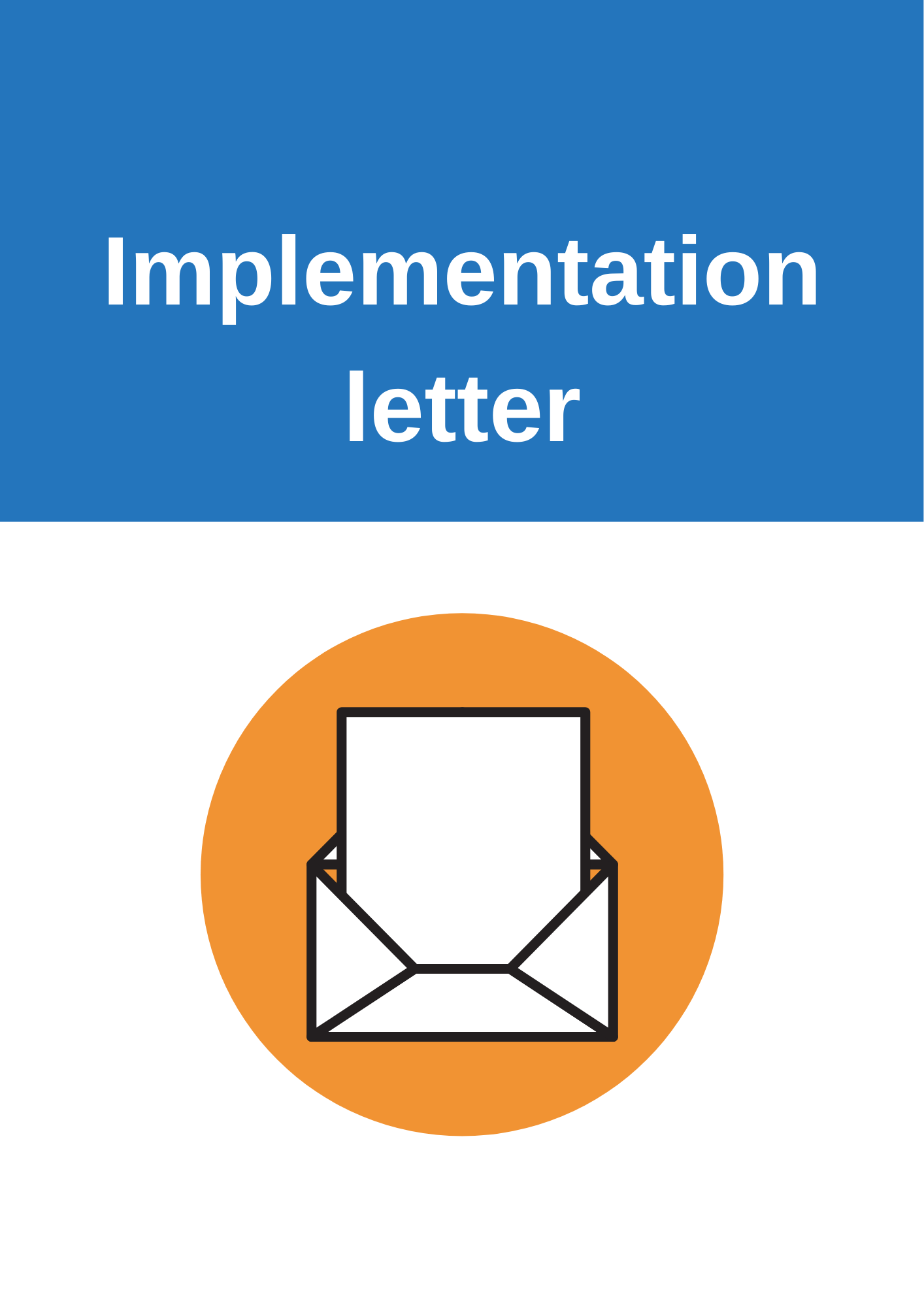
Principles of Partnership implementation letter.
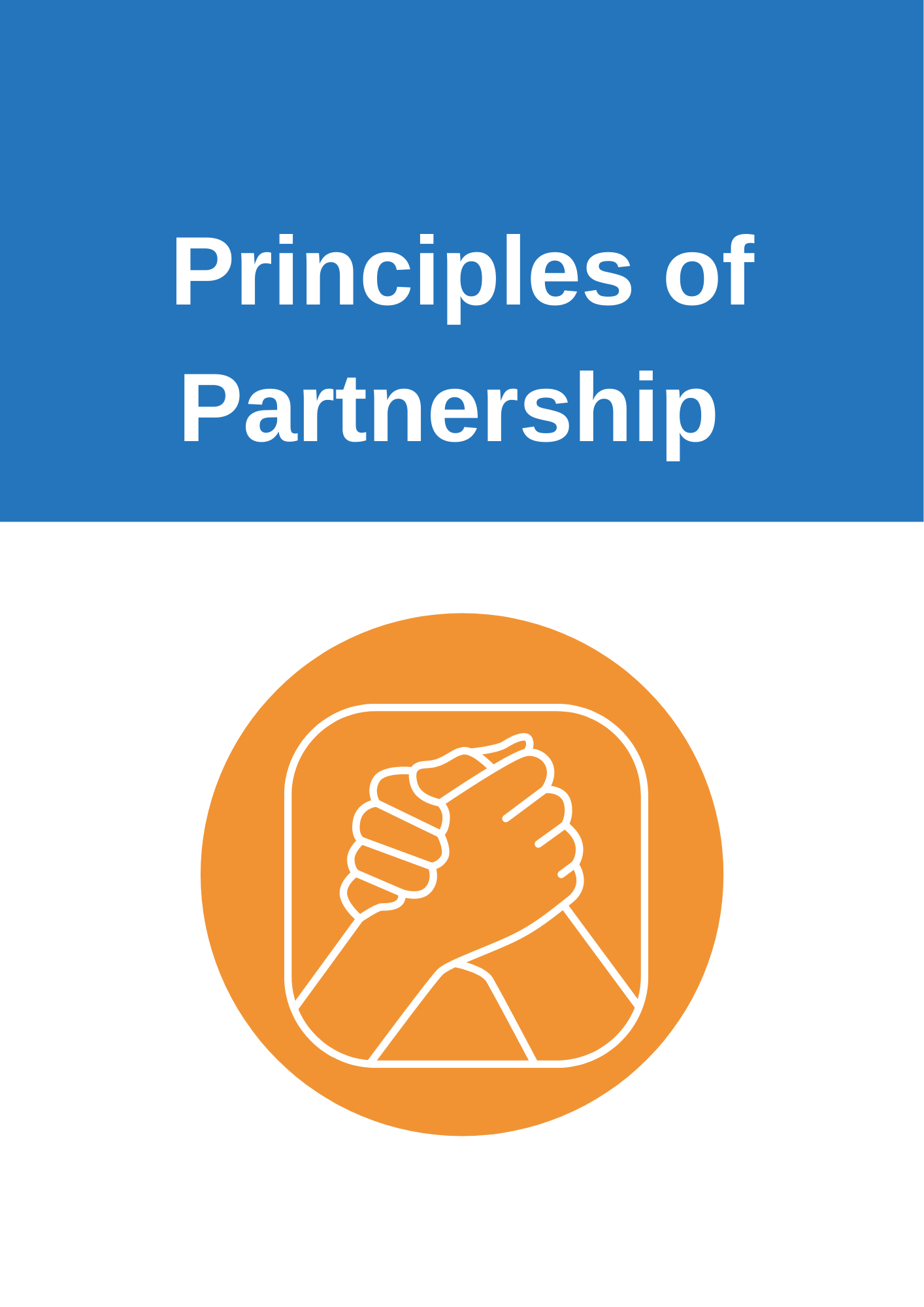
Principles of Partnership – Endorsed by the The Global Humanitarian Platform in July 2007.
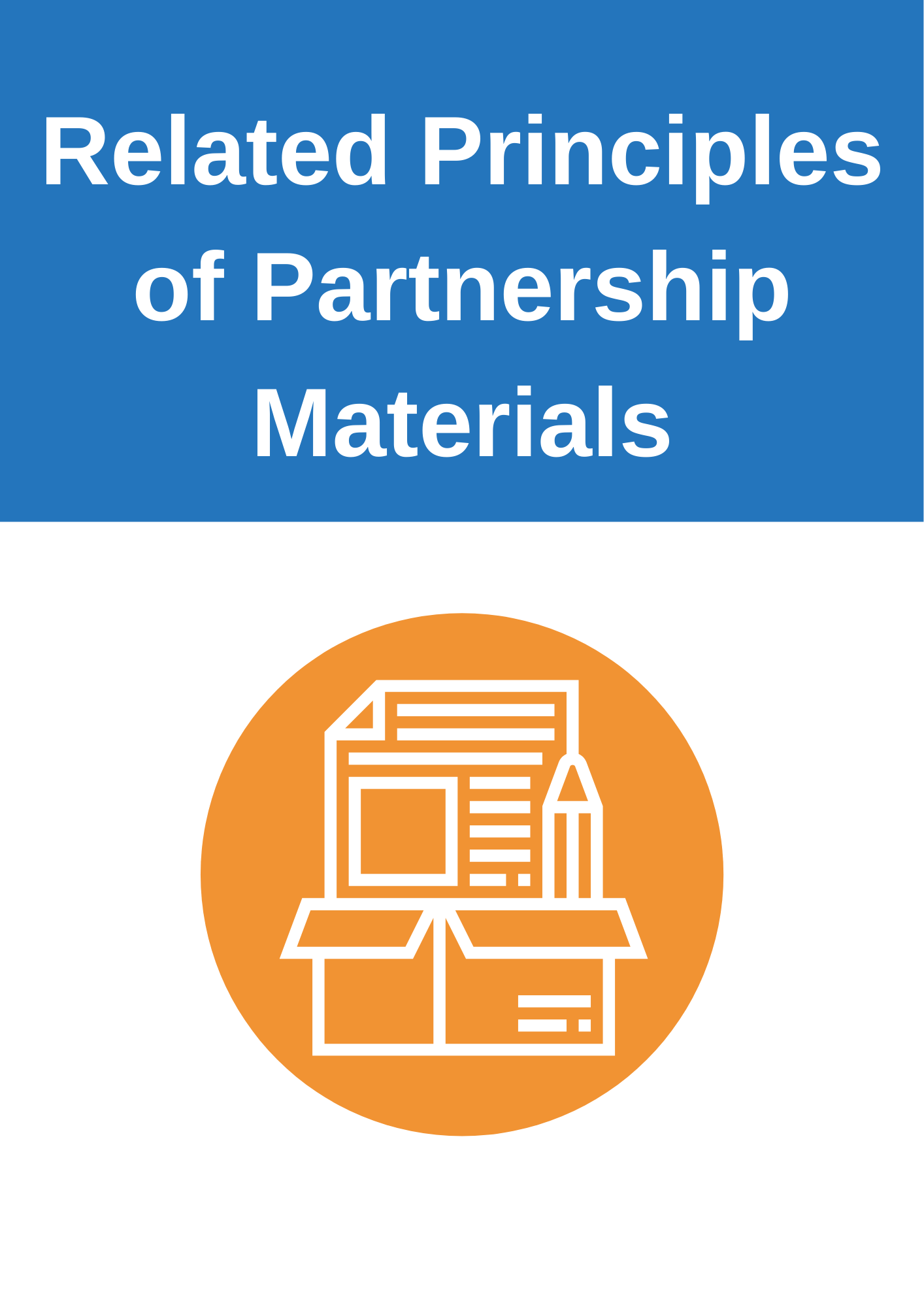
A list of Principles of Partnership resources.
The Global Humanitarian Platform (GHP) was an initiative flowing from a July 2006 dialogue between the United Nations (UN) and non-government organisations (NGOs). 40 leaders of humanitarian organisations from the UN, NGOs, the Red Cross and Red Crescent movement, the International Organization for Migration and the World Bank came together to discuss ways to improve partnerships between diverse humanitarian organisations.
The participants of the dialogue agreed to seek ways to strengthen collaborative work at both the global and the field level, and committed themselves to work together in a spirit of partnership.
The dialogue, co chaired by Jan Egeland, (Emergency Relief coordinator) and Elizabeth Ferris, from the Steering Committee for Humanitarian Response, representing the non-UN organisations, was held in Geneva from 12-13 July 2006.
The GHP was a stand alone forum bringing together the three main families of the humanitarian community – NGOs, the Red Cross and Red Crescent Movement, and the UN and related international organisations.
Three annual meetings of the GHP were held in 2007, 2008, and 2010. In between these meetings a steering committee, a working level group, and latterly a task force team were assigned to oversee the GHP process and implementation of activities.
The overall goal of the GHP was to enhance the effectiveness of humanitarian action.
A key commitment was to look closely at current practices of partnerships, to identify practices that could improve relationships between humanitarian organisations. The GHP also placed a special focus on strengthening the involvement and engagement of national organisations, as they are often the first to respond to disasters, and have more detailed knowledge of the communities in which they operate.
The humanitarian reforms of the time were also looking to strengthen humanitarian response through improved partnerships between humanitarian organisations, promoting greater mutual respect, and ensuring that roles and responsibilities of humanitarian partners were defined through transparent, inclusive and consultative processes.
The key activities of the GHP were to:
An important achievement during the first year of the GHP was the development and endorsement of the Principles of Partnership (PoP). Leaders of UN agencies, NGOs and the Red Cross/Red Crescent movement, agreed to base their partnerships on the principles of equality, transparency, a results oriented approach, responsibility and complementarity. The PoP were endorsed at the July 2007 Global Humanitarian Platform meeting, co chaired by the Emergency Relief Coordinator, John Holmes, and ICVA’s Thomas Getman. At the same meeting, leaders of the GHP partner organisations agreed to implement the principles within their own organisations policies and to provide feedback to the GHP on the applications of the PoP.
A number of tools were developed to encourage partners to use and evaluate the implementation of the PoP. Since their endorsement the PoP became a common point of reference, however there was general agreement at both the 2008 and the 2010 GHP meetings that there was still much to be done if the PoP were to be mainstreamed into all aspects of humanitarian work.
Key challenges to putting PoP into practice included:
Discussions at the IASC Principals meetings about the importance of partnerships, the growing complexities of the humanitarian military relationships, and the need for more diverse funding channels have kept the strategic dialogue on the importance of partnerships and how to improve them very much alive.
During 2008 regional workshops, held in Jordan and Thailand, discussed the progress to date of the implementation of the PoP, highlighting the need for coordination mechanisms to be more inclusive of humanitarian partners. Case studies in Myanmar and Chad in the same year illustrated some of the major challenges of implementing the PoP, in particular the difficulties around civil-military relationships, a lack of experienced humanitarian staff, and the complexities of working with national and local NGOs.


Minutes for GHP meetings held in 2007.
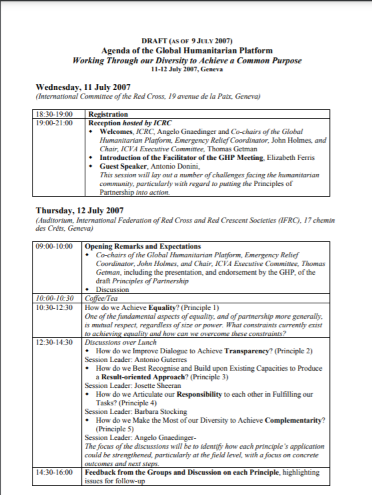

A list of minutes held in 2008.
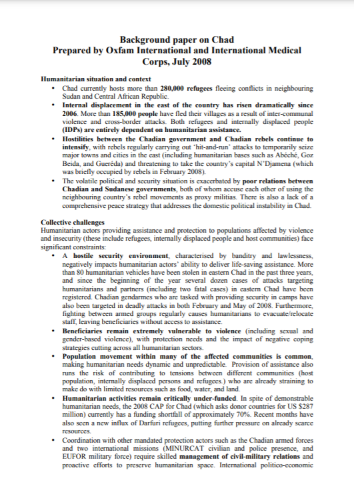
GHP meeting.
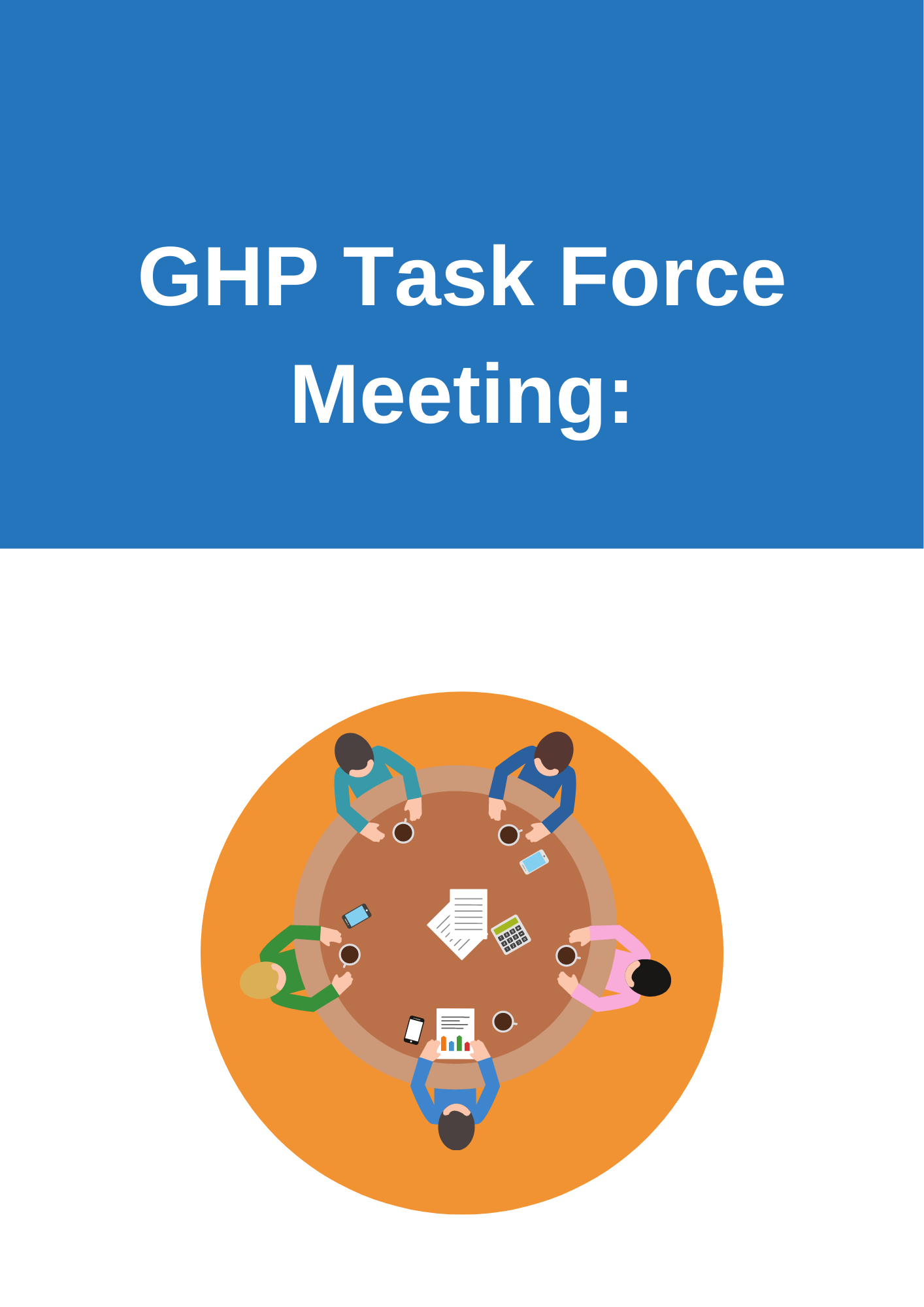
GHP task force meeting materials.

Summary notes.
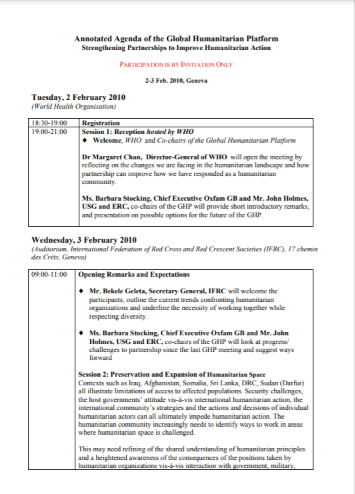
A list of resources on the meeting on strengthening partnership for effective humanitarian action.
In the lead up to the World Humanitarian Summit (WHS), and building on momentum from the ICVA network over the last 12 months in support of the Principles of Partnership, the ICVA network has submitted its contribution to the WHS Secretariat: ‘The Power of Principled Partnerships’.
Complemented by the #ICVAPoP campaign, ICVA calls upon:
It has been over seven years since the Global Humanitarian Platform (GHP) introduced the Principles of Partnership (PoP). The PoP were identified as foundational principles to bring together humanitarian actors on an equal footing. The PoP include:
Since 2007, humanitarian actors have developed numerous tools to implement the PoP -and to report on their implementation. Over the years, NGO partnerships have provided many examples of challenges and successes in implementing the PoP, often in difficult and testing crises.
ICVA believes that the World Humanitarian Summit (WHS) provides an important opportunity to highlight partnerships, and in particular, the PoP. The WHS four thematic areas, and the seven themes2 emerging from the recent WHS thematic meeting in Bonn, further highlight the importance of principled partnerships in humanitarian action.
ICVA is calling on all humanitarian organizations to support the Principles of Partnership, and to contribute how you apply these principles within your partnerships and programmes. ICVA invites you to:
1. Sign-up to the Principles of Partnership – by sending an email to principlesofpartnership@icvanetwork.org confirming your organization’s support of the PoP.
2. Provide the ICVA Secretariat testimonials around two themes:
3. Share with the ICVA Secretariat short (no more than 2 minutes) video clips of Staff members:
4. Share the #ICVAPoP campaign amongst your own networks: Extend the reach of the campaign – and appeal to all humanitarian entities to join.
5. Tweet the hashtag #ICVAPoP on WHS and partnership related messages.
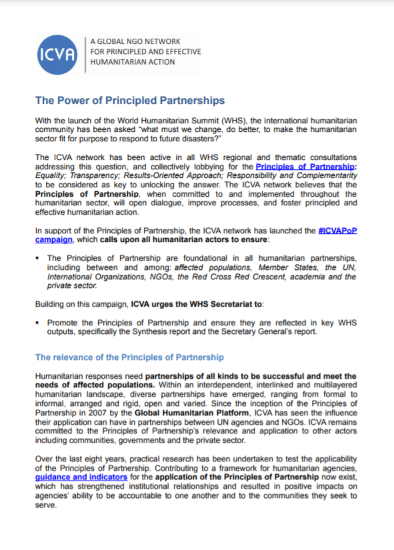
In support of the Principles of Partnership, the ICVA network has launched the #ICVAPoP campaign, which calls upon all humanitarian actors to ensure:
Building on this campaign, ICVA urges the WHS Secretariat to:
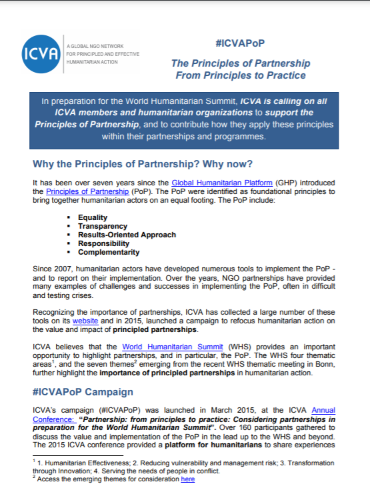
#ICVAPoP campaign documents in English, French and Arabic.
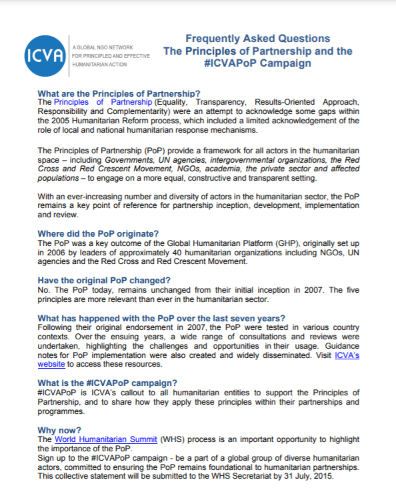
A list of frequently asked questions about the Principles of Partnership and the #ICVAPoP Campaign.
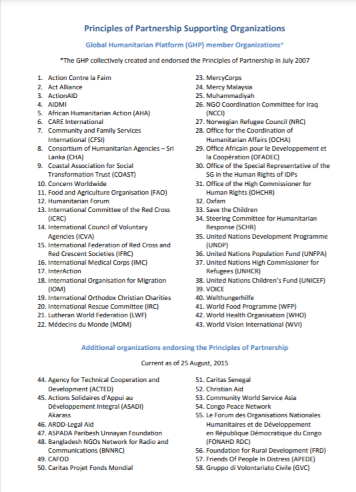
Check out a list of organizations endorsing the Principles of Partnership and short video testimonials on the PoP.

ICVA is a global network of non-governmental organisations whose mission is to make humanitarian action more principled and effective by working collectively and independently to influence policy and practice.
International Council of Voluntary Agencies
NGO Humanitarian Hub,
La Voie-Creuse 16, 1202, Geneva, Switzerland
Email: secretariat@icvanetwork.org
A curation of monthly updates, latest news, tools, and events around forced migration, coordination, financing, and cross cutting issues all sent straight to your inbox.